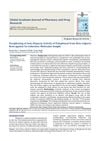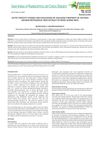Search
forLearn
5 / 30 resultslearn Pyrilutamide
highly targeted anti-androgen that might have minimal systemic effects
learn Rapamycin
mTOR regulator and immunosuppressant used more recently for anti-aging and hair regrowth
learn RU58841
a potent but unapproved and potentially problematic topical anti-androgen
learn Cetirizine
popular antihistamine showing promise for hair loss as an anti-inflammatory and prostaglandin inhibitor
Research
5 / 1000+ resultsresearch Anti-Alopecic Activity of a Novel Compound from Aloe Barbadensis Miller
A compound from Aloe barbadensis Miller can help regrow hair better than minoxidil.

research Molecular Docking Studies and ADME-Tox Prediction of Phytocompounds from Punica Granatum Peel as a Potential Anti-Alopecia Treatment
Pomegranate peel compounds may help treat hair loss.

research Deciphering Anti-Alopecia Activity of Polyphenol from Beta Vulgaris Root Against 5α-Reductase: Molecular Insight
Beetroot extract may help treat hair loss naturally with fewer side effects.

research Acute Toxicity Studies and Evaluation of Analgesic Property of Tectona Grandis Methanolic Seed Extract in Swiss Albino Mice
Teak seed extract is safe and reduces pain in mice.

research Comparative Study of a Topical and Oral Combination Therapy Containing Oleanolic Acid, Apigenin, and Biotinyl Tripeptide-1 in Patients with Androgenetic Alopecia: A Prospective, Open-Label Trial
The combination therapy improved hair growth and thickness in people with androgenetic alopecia.
Community Join
5 / 1000+ resultscommunity Novel Formulation To Put An End To Hair Loss Once And For All.
A pharmacy student proposed a hair loss treatment using minoxidil, finasteride, clascoterone, and tretinoin, aiming for high effectiveness with minimal side effects. Reactions were mixed, with some questioning its feasibility and others showing interest.
community 57% increased chance of pattern hair loss independently associated with the consumption of sugary beverages in men (p<0.001) Pt 2
Sugary beverages increase the risk of pattern hair loss in men by 57%. Treatments discussed include Minoxidil, finasteride, and RU58841.
community Youre missing something in your battle against hairloss.
Moringa extract and oil are suggested to help with hair loss, with some users combining it with treatments like minoxidil, finasteride, and dutasteride. Moringa is claimed to improve hair growth and health, but evidence is mostly anecdotal.
community Lipisomal Solution (Dutasteride / Tretinoin & Minoxidil & Tretinoin) Horror Story Warning
Using liposomal solutions with dutasteride, minoxidil, and tretinoin worsened hair loss due to buildup and scalp issues. Consulting a professional and returning to simpler treatments like finasteride and minoxidil improved the situation.
community The story of RU58841/PSK3841
RU58841, an anti-androgenic compound, showed early promise for treating alopecia but faced challenges after its patent in 1997. Despite advancing to Phase II trials, safety concerns and financial struggles led Aventis to abandon its development. Proskelia, which later merged into ProStrakan, couldn't prioritize the drug, leading to its eventual stagnation and failure to reach the market.